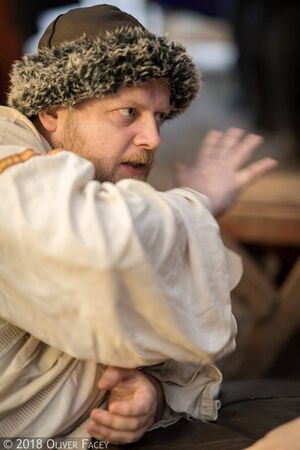A little understanding
"Magistrate Abraham was apparently present at the time."
Alder stifled an internal groan. He took off his glasses, placed them on the desk in front of them and pinched the bridge of his nose. This was a massive case... the trial of four cardinals condemned for blasphemy and heresy. It was completely unprecedented. Nothing like this has ever happened in the history of the Empire. Concerned citizens across the Empire would be watching to see what happened. Given how momentous it was, surely Abraham would have had the good sense not to say anything intemperate?
"He apparently declaimed loudly about what was happening to everyone present."
This time there was no stifling the groan. "Of course he did. Has anyone complained?"
"Not exactly... There was some concern his opinions might prejudice the case."
Alder resisted the urge to say how unlikely he thought that possibility was. Better to take a more diplomatic tack. "Well if anyone does complain, tell them that Chief Magistrate Karkovitch and our new Chief Magistrate, Kuura Tuomisbarn, will choose who is going to try this case. If Magistrate Abraham is a witness, then I would expect that he is significantly less likely to get chosen."
Alder looked at his assistant and considered his next words carefully. He glanced around and dropped his voice slightly. "And if that doesn't satisfy them, perhaps find some innocuous way to point out that Magistrate Abraham's area of expertise is the Bourse, as he never tires of telling us..."
Jenny looked at her boss for a moment, before realisation dawned on her face. "Got it. Bourse. Will do."
Alder nodded at her, but she'd already turned to go back to her duties. Typical Marcher he mused, always keen to get back to work. "You can take the Marcher out of the field, but you can't take the field out of the Marcher." he thought to himself. Or was that apples? Something like that anyway.
Overview
- During the Autumn Equinox several Cardinals of the Synod were condemned for heresy and blasphemy by the Vigilance assembly
- The magistrates are investigating these charges, and trials of the four involved appear inevitable
- This condemnation, and the acts that apparently prompted it, have significant implications for the Imperial Synod, the Way, and the Empire as a whole
At the Autumn Equinox, three of the cardinals of the Imperial Synod, and a citizen who was acting as proxy to the Cardinal of Prosperity, publicly swore an oath to bear an aura of Peace for the coming year. They promised to carry the hallowed item, and do nothing to resist its effects. One of the number, Zadkiel de Coeurdefer, immediately resigned his title, presumably a response to what had just taken place. Despite this, all four were quickly condemned as heretics and blasphemers by the Assembly of Vigilance, members of whom apparently bore personal witness to the ceremony accompanying the bestowal of the hallowed items.
Not all fully agree with this decision however. Kalina Jadwigowna Piosnkowa Prochnost the Virtue Inquisitor of Wisdom called Silas, Cardinal of Wisdom to inquisition. The Wisdom Assembly also passed a statement of principle stating that they supported the cardinal's actions to test his knowledge of "understanding" and the General Assembly passed a judgement that some believe vindicates the cardinal of the charges of heresy and blasphemy, although the wording is unclear.
In the history of the Empire, there has never been a successful judgement of condemnation against a member of the Assembly of the Nine elected by the Virtue assemblies. The magistrates are now bound to conduct a trial to investigate the religious crimes these cardinals are accused of. Meanwhile, the General Assembly must wrestle with this growing schism - following so closely on the heels of the recent crisis concerning Vardas - and contemplate what it means for the Way.
The assembly of Vigilance condemns the cardinal of Ambition, Lady Viviane de Coeurdefer of Dawn for blasphemy and heresy having whole-heartedly taken upon themselves a binding oath to receive an aura of the false virtue, Apathy, and to have created a hallowing of the same, which they agree to bear for one year during which they will not at all counter-act the effects of, in any way. Their position gives a greater graveness to this act of heresy and brings a direct threat to the Empire.
Soriah, Autumn Equinox 386YE, Vote: (Greater Majority) 380-40We the Vigilance assembly condemn the Cardinal of Pride, Zadkiel de Couerdefer, for the religious crime of taking on willingly and knowingly a hallowed object, dedicated to a false virtue. In addition, for swearing an oath to follow the false whim of the hallowing and make no attempt to counteract its dangerous ways. These are actions of abject heresy and blasphemy. The cardinal has squandered their dedicated virtue in favour of apathy and collaboration with enemies of the Empire. Have they no Pride?
Jeroboam of the Sentinels Tower, Autumn Equinox 386YE, Vote: 280-110The Assembly of Vigilance condemns the Cardinal of Wisdom, Silas of the Cenotaph, for blasphemy and heresy. In agreeing for a hallow of the False Virtue peace to be created and giving a binding oath to bear it wholeheartedly - without use of any source of spiritual strength to resist it. This spits in the face of the Synod who works to eliminate these threats from the Empire. We expect better.
Sam Wych, Autumn Equinox 386YE, Vote: 286-58The assembly of Vigilance seeks to condemn Iniska Ashwood, proxy cardinal of prosperity, under the grounds of heresy and blasphemy. By accepting an aura of a false virtue through hallowing and agreeing to take an oath to Axou, they have tainted their soul. Without any spiritual protection they have put others in extreme danger, as a proxy cardinal they must be held accountable and should know better.
Alastair of Esther's Sanctum, Autumn Equinox 386YE, Vote: 154-48A Peaceful Invitation
- The roots of this crisis lie with a sect of Axou priests, and a populist movement in Axos
- A gift of liao and a letter from the Throne themselves were instrumental in arranging the creation of these malign spiritual auras
The current crisis has been unfolding for some time. Ilarch Kyther Deianeira is an ambitiousAxou who is the head of a populist political movement, influential in multiple citadels. They are known to be allied with Theodosia of Ipotavo, a religious leader who preaches on the "false virtue" of Peace. In Summer 386YE, Deianeira responded to the ambassador's missive with an open offer to the Assembly of the Nine. They claimed to have discovered that the Assembly were interested in experiencing the auras of what the Axos call "Understanding" - that is, Peace - and the Ilarch was prepared to send a priest to hallow one item for each member of the Assembly of the Nine. The catch was that each recipient must swear an oath, before their peers, to bear the hallowed item for a year.
The Empire duly provided the Ilarch with the assistance they required in return, one hundred doses of liao and a letter from the Throne, thanking the Ilarch and recognising their good will. Kyther has been employing this gift and this communication in pursuit of their goals in Axos, as evidence that the Axou can “punch above their weight” on the world stage. In return an Axou priest, dedicated to the false virtue of Peace, came to Anvil, to meet with the Assembly of Nine. They hallowed an item for each of the cardinals who was prepared to publicly make the required vow.
The Axos Agenda
- The priest who came to Anvil was a disciple of Theodosa of Ipotavo
- The sects of Axos despise the Way and the Imperial Synod
- Axou religious sects are not united in the way the Assemblies of the Imperial Synod are, but they agree that the Way is a wicked faith that serves a false creator
- It's not clear whether this disruption is intentional or not, but it cannot help but serve Axou political aims
It's not clear the Axou stand to gain from all this is. The Shuttered Lantern are investigating the situation in Axos, but there are clearly complicated political agendas at play. Theodosia of Ipotavo is thought to be a genuine advocate for Peace, though her precise teachings are not well understood. During her recent visit to the Empire, she is not known to have attempted to preach her blasphemy. Ilarch Kyther Deianeira and their supporters are not believed to advocate for Peace, and there is no suggestion that they are particularly religiously motivated at all. Indeed their movement is primarily based in Axou nationalism. It is more likely therefore that Kyther saw this as an opportunistic attempt to curry favour with the Empire by demonstrating that Axos could provide things of value, while taking a stance that would preserve their pride and dignity.
Priests in Axos happily make use of all the true virtues, but they also make use of "spiritual forces" like Peace, Vengeance or Hatred. They are known to be implacable opponents of the Way. They believe in a malign Creator, and claim the Labyrinth is a torture chamber built by that wicked Creator to hobble humanity and prevent them from achieving their true destiny. As a result, many Axou despise the imperial Synod, which they believe serves the Creator by tricking people into believing that reincarnation is a good thing. Despite this, it does not appear to have been the Ilarch's intention to cause trouble for the Synod through their actions... but if this incident does cause problems for the Synod that will probably serve their political goals well.
Vital Evidence
- A copy of the letter sent to the Assembly of Nine by Theodosia appears to be a key piece of evidence related to the condemnations
- The Magistracy have asked the Civil Service to make their copy of this letter public
It is understood that the priest sent to the Empire, a disciple of Theodosia, came with a letter from their teacher. The civil service managed to get hold of a copy before the priest returned to Axos. In light of the condemnations, the letter, which contains the oath the Cardinals swore, may prove a critical piece of evidence at trial. The magistracy, therefore, have asked that it be published to attendees of the upcoming summit at Anvil so that all parties may have an opportunity to consider the letter and its implications. The letter mentions a pamphlet - copies of this are not available, but presumably some of the parties present at this event may have copies.
To the Assembly of Nine of the Imperial Synod,
I regret that I could not meet you in person, though I believe I did meet one or two of your number at the Printer’s Guild Ball last year – in particular I remember meeting the Cardinal of Ambition who struck me as a very interesting individual. In general I was struck by the openness of many of the Synod priests I spoke to during my visit to considering viewpoints I would have thought were considered at best heterodox positions. It seems the composition of your Synod at this time is open to new ideas and ways of thinking, and I think this is to your credit. I have been thinking much about the strengths of your Synod and the ways in which it might provide a pathway toward the unification of my own people through their spiritual beliefs.
I have been asked by Illarch Deianeira to compose the oath we require of you. The text I have come to is as follows:
“I swear to bear this hallowed item in such a manner as to give full effect to the aura that lies upon it. I will not use spiritual strength that comes from within or without to resist it, but will truly respect its effects and experience the world through the lens it offers, and hence come to a more whole understanding of the spiritual power it represents. I will not share it with others, passing it around like some curio, but treat it as a precious thing. This I will do until the power of the hallowing ceases and fades away, in one year’s time.”
Illarch Deianeira sees this as an essential commitment by you to treating Axou beliefs and practices seriously. I know there are people like the New Scions of Atun in your Empire who are extremely concerned with what I might call an experimental approach to theology. While I respect this, our concern is that it would be easy enough to “sample” an aura and then cast it aside.
As a theologian I am a phenomenologist: I believe that our understanding of the world – including the Virtues and other spiritual powers of the world – comes primarily from our experiences of them, but I believe they must be experienced wholly and with an open heart to the experience, rather than with the experimentalist’s sceptical distance. I am hopeful you will commit yourself to this.
I have prepared a pamphlet on the spiritual power of Understanding, a lightly edited version of an earlier work of mine. I have sent copies of this with my disciple Sophia Anacharsis who will be delivering this letter, along with nine of the doses of liao you kindly provided. She will hallow one item for each member of the Assembly (including the Throne) as long as they are prepared to swear the above oath – it is your choice what hallowing she performs, and the pamphlet ought to help you make that decision.
I will not be offended at all if none of you decide to take up the offer. I have asked Sophia to be careful in discussing any details of religion with anyone other than yourselves while she is here – she does like to engage in theological discourse, but I want to respect your laws and traditions as I know you will respect ours. Please also pass along my regards to Ambassador Nighthaven who was of great help to me during my recent visit.
May you have the vigilance and wisdom to avoid the Creator’s evil, in all your days, and I wish the eyes of your ancestors upon you,
Yours faithfully,
Theodosia of Ipotavo
The Role of a Cardinal
- Imperial pilgrims of the Way are deeply concerned about the revelation that Cardinals are partaking of malign spiritual auras
- The outcome of the trial, regardless of which way it goes, will unavoidably send a message to everyone who follows the Way
The condemnations have provoked considerable interest across the Empire. The revelation that four members of the Assembly of Nine opted to accept a hallowing of a false virtue, and that they swore an oath to abide by that aura and not attempt to resist it for a year, has surprised and alarmed many. Thus far this alarm has not let to action - people seem eager to know more, but content to wait for the resolution of this matter - but the situation will change once the matter is resolved.
If the cardinals are found guilty at trial and receive a harsh sentence, then that will send an unequivocal message to everyone in the Empire that they should not have anything to do with false virtues or auras thereof. If the cardinals of the Assembly of Nine face punishment for this, then what hope would there be for any ordinary citizen that they might escape punishment for the same? People would exercise more caution in future - with this incident serving as a salutary lesson in the the dangers of foolish or Unvirtuous action.
If the cardinals avoid punishment for their actions, that is likely to have the opposite effect. There are people who claim that the spiritual dedication of the cardinals places them beyond reproach and gives them more leeway than the average citizen for dallying with false virtues. Such arguments carry little or no sway beyond Anvil, where the common citizen's view of a cardinal is that they embody spiritual purity. The legal responsibilities for a cardinal state that they should provide leadership to the priests and pilgrims who follow their virtue and are expected to be well versed in matters of virtue and The Way so that they can speak with authority on matters of doctrine. There is no responsibility for them to be somehow more Virtuous than other citizens, but none-the-less that is the common expectation of cardinals, gatekeepers, inquisitors and similar.
As a result, the wider population will respond negatively to any statement that urges people to view these matters as fitting for a cardinal but too testing for other mortals. People expect more virtuous behaviour of their cardinals than they do of themselves, they do not give them leeway to engage in activities which would be condemned as blasphemy or heresy if conducted by others.
This is the key reason these condemnations have proved so dramatic - had any "normal" citizen of Anvil been accused of this, most people would have thought that a matter for the Synod and the magistrates and of little importance to them. The fact that it is four of the cardinals of virtue who have done this, is what makes these action so momentous and significant.
The fact that at least one of the accused, Iniska Ashwood, is believed to be a member of the Doctrine Reform Council, currently examining the the Doctrine of Seven, has only served to further raise the stakes. If that is true, if one of the priests reviewing this Doctrine is now carrying out their work while directly under the influence of a False Virtue, then that only makes this even more significant than it already is.
The Role of a Proxy
- There are some complex legal issues around the status of the proxy of the Cardinal of Prosperity
- Regardless of the legal situation, as far as the followers of the Way are concerned, the proxy acted on behalf of, and with the knowledge of, the Cardinal
Iniska Ashwood has been identified in the condemnation as the proxy for the Cardinal of Prosperity, but from a legal standpoint this is imprecise. While it is common parlance to talk about a title having a "proxy" and it is commonly assumed that a citizen who bears a letter indicating they have the power to proxy a title is "their proxy", this is not accurate in a legal sense. Legally speaking, Iniska Ashwood can only be acting as proxy to the Cardinal of Prosperity at the point where they are using one of the legal powers of the title. At that point they are acting as the proxy for the actual Cardinal of Prosperity, and any action they take is legally considered to be an action undertaken by the Cardinal of Prosperity.
In this case, none of the legal powers of the Cardinal were enacted at the moment in question. Iniska Ashwood was being given all the respect due to the Cardinal of Prosperity, citizens were treating them as the Cardinal as is common for a proxy. But the legal situation is very clear, they were not acting as the Cardinal in a legal sense and their actions cannot be considered to be the actions of the Cardinal. As such, it is Iniska Ashwood that is liable for their actions, not the current Cardinal of Prosperity, Darian Numbers. Whatever actions they have taken, were taken in their capacity as a private citizen, not as the Cardinal of Prosperity.
That is the precise legal situation, but that has minimal bearing on the way many Imperial citizens feel about these events. Most folk understand that this offer was made to all the members of the Assembly of Nine. For most followers of the Way it is hard to believe that Iniska Ashwood was not acting on behalf of the Cardinal of Prosperity, with their full endorsement. Iniska's punishment or exoneration will carry the same weight with the faithful as that of the other three accused.
The Magistrates Try
- A citizen who is condemned by the Imperial Synod will face trial by the Imperial magistrates
- The priest who raised the judgement will be expected to present their case
- The magistrates have indicated that they intend to start the trial at 3pm on Saturday in the Senate
Imperial law defines an entire category of offences - religious crimes - which are raised by the Imperial Synod but tried by a magistrate. The process begins when the Imperial Synod condemns a citizen because they have determined that the actions they are accused of performing constitute a religious crime.
It is common for the Imperial Synod to conduct an inquisition first, but there is no legal requirement for that to happen. It is wise however, for the priest who raises the judgement to be certain of their facts as the magistrates will expect the priest who raised a condemnation to present their case at the trial in most cases. Priests who are perceived to have acted recklessly may themselves face censure by the Synod, with the risk of being condemned for an abuse of powers.
Conviction is never guaranteed as the magistrates must conduct a trial to determine guilt. The first stage in that assessment is to investigate the evidence that the accused have done the actions they have been accused of. In this particular case, that stage is unlikely to take long, since the act happened very publicly with many witnesses, including Magistrate Abraham of the Constitutional Court. If the magistrates determine that the four have physically done the action they are condemned for, then the magistrate must determine if that action meets the definition of the religious crime. In this case it is charges of blasphemy and heresy - which are defined as:
- Blasphemy: The denigration of the paragons and the paths of virtue. This includes promoting false virtues and the teachings, or example, of false exemplars or False Paragons.
- Heresy: The willful rejection, or perversion of, the orthodox Doctrines of the Faith as laid down by the Imperial Synod, or actively teaching and promoting false doctrines.
According to legal doctrine, it is for the magistrates to decide whether the actions meet these definitions or not, but in practice it is customary for a magistrate to place great weight on the deliberations on the Imperial Synod. A magistrate must ensure there is no miscarriage of justice taking place, but the Assembly of Vigilance has already been explicit that they consider that the actions of those involved meet these definitions. The Assembly of Vigilance have condemned them, so provided they present a credible case at trial, that condemnation is likely to weight heavily on the magistrates adjudication of this trial.
If the magistrates do find them guilty at trial, they will still look to determine intent. The Synod are not required to take account of intent when they condemn someone for a religious crime, but it is crucial to the application of Imperial law by the magistrates. The harshest penalty - the death sentence - is usually reserved for cases where the accused intended to carry out the act. If the magistrates conducting the trial do not find that the accused intended to commit blasphemy and heresy - if they determine that that was not the intent of their actions - then they are most likely to be given a lesser sentence. That is still likely to be an expensive proposition involving heavy fines for anyone found guilty.
Clemency
- A citizen who confesses their guilt may ask a priest to plead for clemency on their behalf
- A priest, even a cardinal, cannot plead for clemency on their own behalf
Imperial law allows a citizen to ask a member of the Synod to plead for clemency at trial if - and only if - they confess their guilt. If the act was done for virtuous reasons, a priest may speak on their behalf and ask for clemency from the magistrate. They must accompany the recipient to trial and lay out the reasons why their virtuous behaviour should result in a reduced sentence. Only a priest can plead for clemency and only on behalf of another - a priest, even a cardinal, cannot make their own plea for clemency.
Clemency is only available to those who plead guilty. You cannot plead that there was a virtuous reason for the thing you are accused of and simultaneously claim that you didn't do the thing you are accused of. Clemency does not mitigate a crime - it asks the magistrate to impose a reduced sentence by acknowledging the virtue of the actions. It is not uncommon for citizens to imagine that they will receive no punishment for their actions because a priest claims that they acted in virtue but that is very rarely the case.
The magistrates have provided additional guidance for clemency, to help citizens understand the process. Of course the cardinals are likely to understand this information already, but it may assist those who are taking an interest in this trial.
The Synod Judges
- The General Assembly could vindicate one or more of the four accused, by explicitly stating that bearing a false virtue and allowing yourself to be influenced by its power is neither heretical or blasphemous
- Doing so would have a major impact on this trial
- It would also send a powerful message to every citizen of the Empire that it was acceptable for them to do this
The Assembly of Wisdom has passed a judgement that appears to uphold the Virtue of the actions taken by their cardinal. Silas was called to inquisition, and thus far there has been no direct escalation to sanction from Kalina Jadwigowna Piosnkowa Prochnost, either a vindication or otherwise. But the General Assembly have passed a judgement that publicly backs the Cardinal which implies strongly that they believe that there is Wisdom in this course of action. This judgement does not have any specific legal implications at this point, but it is something that the Cardinal of Wisdom might call upon at trial. It may not be easy to demonstrate that their actions do not constitute blasphemy or heresy, since the Vigilance Assembly have already determined that they do - but the backing of the Assembly would provide a powerful basis for a clemency plea, especially given that the Cardinal of Wisdom is the one accused.
This assembly supports Silas of Cenotaph actions to test his knowledge of "understanding".
Palladius Ravenspire, Wisdom Assembly, Autumn Equinox 386YE, Vote: Upheld (170-18)Vindication: Breaking an oath is not a religious crime. Swearing an oath one knows they may break my be perilous but is not a religious crime. Silas, Cardinal of Wisdom, states his intent in holding a false hallow, to be grounded in Wisdom. Let us judge him on how he acts rather than words spoken to heretics; we vindicate him in this matter up to this point.
Solas of the Spire of the Waxing Sun, General Assembly, Autumn Equinox 386YE, Vote: Upheld (406-42)The General Assembly has vindicated Silas, but they have done so in a very limited and circumspect way stating that "Swearing an oath one knows they may break my be perilous but is not a religious crime." This is categorically the case - swearing an oath is not a religious crime and any attempt by the Synod to treat that action as a crime would be quickly thrown out by the magistrates. However, Silas was condemned for "agreeing for a hallow of the False Virtue peace to be created and giving a binding oath to bear it wholeheartedly...".
The implication of the General Assembly seems to be that the Cardinal of Wisdom fully intends to violate the public oath to the foreigners - that they do not intend to bear the hallowed item they have been given. If that is the case, that could form the basis of a defence at trial - by demonstrating the Cardinal has not done all that they are accused of. Of course if that becomes public, it is likely to impact relations with the Axos, or with the Ilarch who facilitated this crisis, at the very least. It may also raise serious questions about how much the promise of an Imperial cardinal can be trusted, and under what circumstances they might decide to break such a promise. If the Cardinal fully intends to keep their vow - then the statement of the General Assembly is unlikely to make a major difference either way - since it calls on others to judge him on how he acts following the vow, not on the basis of the vow itself.
Vindication Implications
- The General Assembly could vindicate the cardinals involved by explicitly saying that bearing a false virtue is not a religious crime
- This would have significant implications for the future
The General Assembly could chose to conduct an inquisition and/or issue sanctions to any of the four citizens involved for the actions the Vigilance Assembly has condemned them for. They might vindicate the actions in question - not just swearing a vow, but agreeing to bear the false aura for a year. Such a vindication would need to go further than simply argue the virtue of the case - it would need to explicitly say that bearing a false virtue in this way was not a religious crime - it was not blasphemy and not heresy. But if that happened, it would have three very dramatic effects.
The first is that it would directly impact on the legal trial of the citizen who was vindicated. It would be significantly harder for any Vigilance priest to present a compelling case that the actions of the accused constitute heresy and blasphemy at the point where the General Assembly of the Imperial Synod has explicitly said that that is not the case. The magistrate is likely to complete the trial process - but the accused would have an exceptionally strong case to make that they were innocent of the accused crimes - namely the General Assembly has just vindicated them for exactly those actions - and explicitly said they were not a crime.
The second consequence would be the legal process of condemnation by Imperial Synod. At the point where a Virtue Assembly has issued a clear condemnation of individuals for their actions - and the General Assembly has effectively over-ruled them - that would raise the question of how much weight to give to a condemnation by a Virtue or national assembly in the future. The chief magistrates have explicitly said that they intend to delay the start of this trial until 3pm on Saturday which will give the General Assembly time to consider the situation. If the Assembly makes use of that time to pass an effective judgement of vindication, then the magistrates are likely to adopt the same procedure with all future condemnations - delaying the resulting trial until the General Assembly has had a chance to pass judgement.
The third consequence would be felt across the Empire. The Imperial Synod would be explicitly saying to every priest in the Empire that it was not blasphemy or heresy to carry an aura of a false virtue. Any attempt to argue that it was acceptable for a cardinal to do this, but not for anyone else to do it, would fall on deaf ears. Citizens of the Empire to look to Anvil for leadership - they broadly follow the statements that the Imperial Synod issues, but they would never accept a "fine for me, but not for thee" edict. Any suggestion that a cardinal might have some special qualities that meant that they could do this, but others should not, would be ignored at best and ridiculed at worst.
If the Imperial Synod choses to say that it is acceptable for the cardinals to bear a false virtue - then they are sending the message to everyone in the Empire that it is acceptable for them to bear a false virtue if they choose.
The Senate Moves
- The Imperial Senate could use one or more Senate motions to change Imperial law
- Doing so will not affect these trials, but would affect future trials
The Imperial Senate is responsible for Imperial law - they set the boundaries of what is and is not legal in the Empire. The magistrates maintain the body of Imperial law and conduct trials, but they make changes to the Law as directed by the Imperial Senate.
Currently Imperial law delegates the authority to initiate a trial for a religious crime to the Imperial Synod. The laws, as written, give the Synod considerable leeway to decide what is a religious crime and what is not. The magistrates don't have to accept the verdict of the Synod in this matter, but they would usually defer to their judgement. This is constitutional, because guarding the Virtue of the Empire is the responsibility of the Synod, but it is not the only possible arrangement.
For example, the Imperial Senate could use a senate motion to make it illegal to carry an object that was hallowed to a False Virtue or malign spiritual presence. If that motion passed, then it would be illegal for any citizen anywhere in the Empire to bear an item that bore an aura with a False Virtue. That would not directly impact the impending trials of the four citizens who have been condemned for blasphemy and heresy, but it would make a significant difference in the future.
If the Imperial Senate made it illegal to carry an aura of a false virtue, then in future there would be no need for the magistrates to wait for instruction to act from the Synod. At the point where they discovered that the law had been broken, they could deal with it in exactly the same way they might deal with a robbery or a murder. That could impact the actions of the four who have been condemned, especially if they chose to continue carrying the auras in defiance of any new law.
The Senate could use a motion to make changes to the legal process for Condemnation - they could make it so that such a judgement can only be raised in the General Assembly. Or they could change the law so that any condemnation bya a virtue or National assembly would be automatically escalated to the General Assembly for final consideration so that it proceeded to trial if the General Assembly upheld the decision.
The Imperial Senate could use a set of Senate motions to make sweeping changes to Imperial law in this way. They could make it illegal to create an aura of a false virtue, or be illegal to dedicate someone to one, or illegal to be dedicated to one. It is already illegal to actively teach and promote false virtues, but that law expects the Synod to be the first to judge what constitutes teaching or promoting. Actions that don't require that element of judgement, like creating or destroying auras, dedications, hallows or consecrations could all be the subjects of Imperial law in a way that would not require any input from the Imperial Synod before magistrates could take action.
The importance of the Synod would inevitably be reduced if one or more motions like this did pass the Senate. The first such motion would definitely be constitutional, requiring a constitutional vote and ratification by the Throne to pass. Subsequent laws might not be considered constitutional votes, if the principle that the Imperial Senate should define religious laws had already been established.
Obviously, any of these motions would be subject to potential veto by the Imperial Synod.
Implications
- More information about malign spiritual presences might help the Senate (or the Synod) to make more informed decisions
Since the Imperial Synod established the Seven Virtues as the core teachings of the Way, there has been a clear delineation between the true virtues, and the malign spiritual presences that are sometimes termed "false virtues". So thorough has the distancing from malign auras been that the Empire has comparatively little actual information about them. There have been some recent efforts to learn more - a former Minister of Historical Research, Caleb of the Cenotaph, was able to uncover significant amounts of information about the power of hatred by commissioning a study of a past live vision purportedly experienced by Adelina Barossa. There is nothing to stop the Minister - or the Senate - commissioning the Department of Historical Research to investigate further. If they did, they would be best served to focus on a single malign spiritual presence at a time, ensuring a stronger focus to the resulting report. The Lepidean Librarian could also seek further infromation but might struggle to research a malign spiritual presence; their power is limited to investigating the lives of paragons or exemplars, or into the details of past life visions. But, as Caleb demonstrated, investigation of a suitable past life vision might provide valuable insight into a "false virtue".
There are more practical considerations however. There have always been small cults dedicated to the false virtues, but what would happen if one or more them were publicly accepted, as they are in Axos? Working out the answer to that question would required the Prognosticators Office. The Imperial Senate could instruct one or more of the prognosticators to explore the potential repercussions of one or more "false virtues" gaining a purchase within the Empire. Eilian Sweetwater would be the ideal prognosticator to produce such an appraisal, drawing on historical events where malign spiritual presences have been more influential. If the Senate instructed the Prognosticators to look into all the recognised malign spiritual presences - hope, peace, anarchy, vengeance, fear and hatred - the resulting report would at the very least give some general idea of any potential dangers or benefits from tolerating these "spiritual forces".
Such reports are always made public, of course. This could dramatically increase awareness of and understanding of "false virtues" - but that may ultimately prove to be a two-edged sword depending on the stance of the Imperial Synod to the "false virtues".







